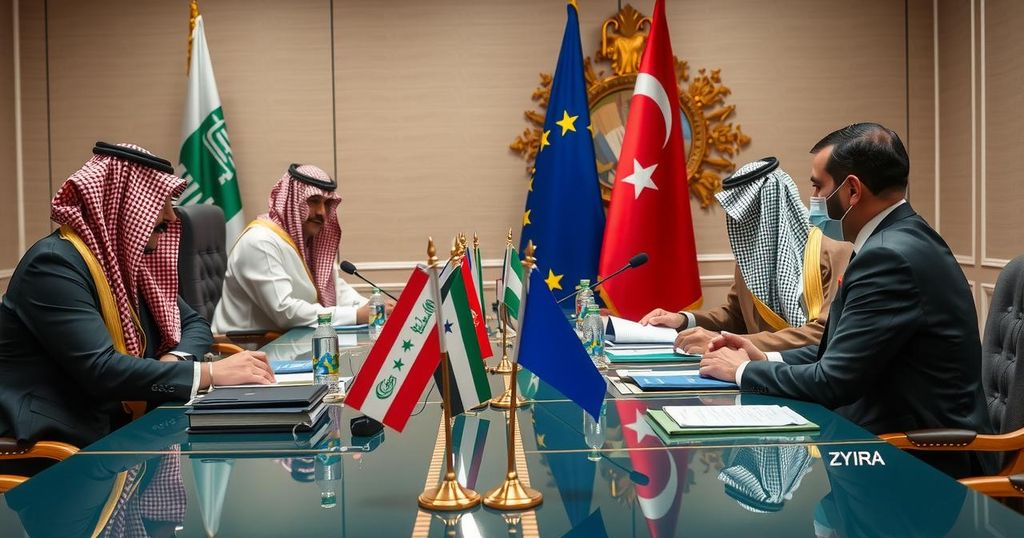Diplomats Meet in Riyadh to Discuss Support for Post-Assad Syria

Arab and EU diplomats met in Riyadh to discuss support for Syria following the fall of Bashar al-Assad. The meetings aim to address sanctions, aid, and the establishment of an inclusive government. Saudi Arabia seeks to enhance its influence, while the situation remains complex due to ongoing humanitarian crises and previous government violence.
In Riyadh, key diplomats from Arab nations and the European Union convened to discuss strategies for supporting Syria following the recent changes in leadership. The meeting underscores Saudi Arabia’s drive to enhance its influence in Syria after the fall of Bashar al-Assad in 2023. The summit will include sessions with Arab officials and further participation from Turkey, France, the EU, and the United Nations.
Syria’s new leader, Ahmed al-Sharaa, is advocating for the relief of sanctions previously imposed by Western nations due to the brutal government responses during the civil unrest that began in 2011. The ongoing conflict has devastated the nation, claiming over half a million lives and displacing millions, many of whom have fled to Europe. Kaja Kallas, the European Union’s top diplomat, indicated that sanctions could potentially be lifted if the new Syrian administration works towards establishing an inclusive government that safeguards minority rights.
Saudi Arabia, which had severed ties with the Assad regime in 2012, is now attempting to negotiate a supportive role in Syria’s transition, post-Assad. The nation’s recent efforts include the provision of essential supplies to the war-torn country, indicating its intention to play a lead role in coordinating regional recovery efforts. Expert Anna Jacobs highlighted the importance of this summit, questioning the extent of Saudi Arabia’s commitment amid existing sanctions.
The discussions in Riyadh follow a prior meeting held in Jordan, where diplomats endorsed a Syrian-led transition aimed at fostering a government representative of all communities, demonstrating a commitment to human rights and the fight against extremism. Notably, representatives from Turkey and Iraq are present, along with the US Under Secretary of State, emphasizing the international focus on regional stability and counteracting terrorism emanating from Syria.
The meeting in Saudi Arabia marks a significant diplomatic effort to stabilize Syria after years of conflict and the recent change in leadership. Following the overthrow of Bashar al-Assad, countries that had previously opposed the regime are now recalibrating their strategies towards Syria, assessing how best to engage with the new government while addressing the humanitarian crises stemming from the prolonged civil war. The discussions are influenced by concerns about terrorism, and the displacement of millions of Syrians, many of whom have sought refuge in Europe. Saudi Arabia’s historical stance against Assad, along with its recent initiatives to provide aid, indicates a shift in its diplomatic approach towards a country that has seen rising tensions and instability under Assad’s rule.
The diplomatic gathering in Riyadh illustrates a pivotal moment for international relations regarding Syria, as nations seek to navigate the complexities following Assad’s ousting. The focus on an inclusive governmental transition, coupled with discussions about sanctions, highlights the challenges and strategic calculations that lie ahead for Syrian leadership and its foreign partners. Saudi Arabia’s initiative to assert influence in Syria signals a broader commitment among Arab and European states to foster stability and recovery in a nation rocked by over a decade of conflict.
Original Source: www.france24.com








